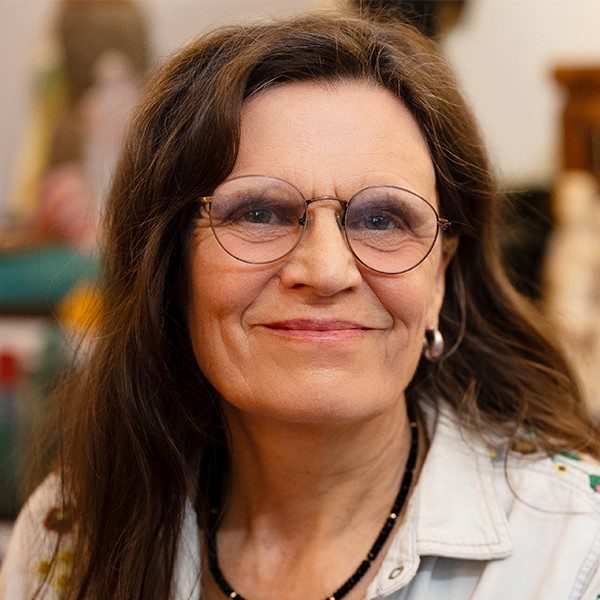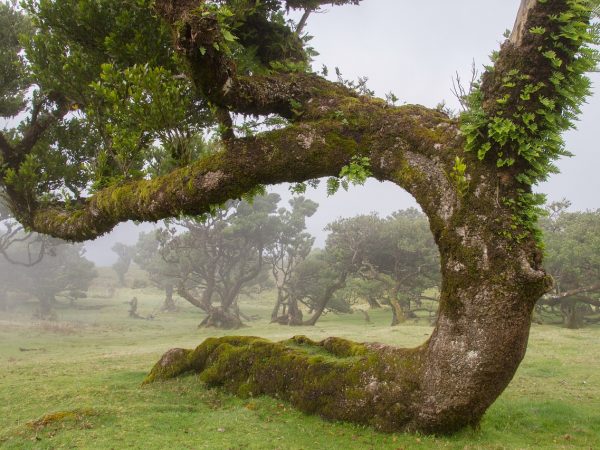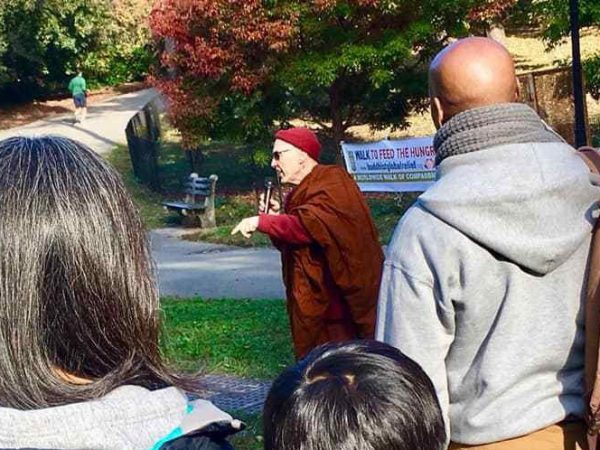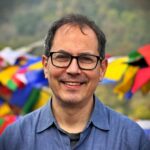With the People’s climate march less than one month away on Sunday, September 21, we offer two sources of inspiration for your participation.
We share this interview with Thanissara, a leading Dharma teacher in the Insight tradition, by the San Francisco Insight Sangha News. Thanissara will be at the People’s Climate March in New York City and invites you to join her there, including a pre-event at New York Insight the day before.
We will follow this shortly with a letter from Brother Phap Ho, Brother Protection, Dharma teacher from the Deer Park Monestary in the tradition of Thích Nhất Hạnh and the Order of Interbeing. Brother Protection invites you to join one of the many People’s Climate March solidarity events taking place worldwide.
We encourage you to find a way to come together in whatever form you can for this extraordinary event in response to extraordinary times. Find out more about the march and our community’s participation here.
On September 15 the “Climate Train” leaves from San Francisco with many Buddhist activists on board, including monastics and practitioners from various Insight sanghas. The 3 days of travel to NYC will be filled with teachings, discussion and collective practice in preparation for the People’s Climate March (PCM) on Sept. 21-22. The march coincides with the United Nations 2014 Climate Summit, which will be attended by heads of state and representatives from more than 80 countries around the world. Go to 350.org to learn more or to sign up for the ride!
Sangha News: What was your personal journey in deciding to become involved with bringing awareness to climate change and the suffering of our planet?
Thanissara: I want to focus on the extremely precarious situation we are in due to the warming of our planet. But for those who are interested, my and Kittisaro’s story is in a book that is coming out on November 4th, Listening to the Heart. We will be doing an introduction for the book at SF Insight on December 7th. I hope you can make it. The book took nearly five years to put together, and it tracks the trajectory from Dharma as a more internal practice to engaged activism.
In brief, I’ve been aware of climate change for a fairly long time, but it really hit home in about 2007 when I was in my home country of England, which, unheard of for such a rainy place, was in severe drought. I was walking one of my favorite footpaths in West Sussex looking at the dry, dry earth, when I became overwhelmed by grief. At a gut level, I knew all that I loved and cherished about “my” beloved little patch of hobbit land was going to irreversibly change.
Sangha News: Tell us about your involvement with Buddhist and interfaith groups to fight climate change.
Thanissara: Following on from the Dharma Teachers International Collaborative on Climate Change, which wrote “The Earth As Witness” statement about climate change, it was clear to me that we needed to engage an activism event. Words are one thing, they are powerful, but standing up with others to register protest and to promote positive solutions is a whole other level of commitment. At the same time I wrote the Teacher Group with the suggestion to do an activism event, 350.org announced the People’s Climate March, which presented an obvious opportunity.
Clearly we wanted to find an eco way of getting to NY and were considering options when Ayya Santussika of Karuna Vihara in Mountain View, CA brought us together with Valerie Love from the Center for Biological Diversity who had already booked places on the California Zephyr. At present we have over 100 PCM people on the train.
At the time of writing, over 700 very diverse organizations have come together to call for immediate climate action. Whether you can make it to the Climate March or not isn’t the most important thing. The important thing is that it signifies a huge alliance.
The main reason we are aligning with diverse faith groups is that until now climate change has been primarily pitched as a political or scientific issue. Most debates on that level, important as they are, tend to be fractious and divisive. However, climate change is primarily a humane and moral issue. Our intention as a combined faith presence is to mobilize a ginormous presence to energize both the spiritual consciousness and activism needed for a very real “game changer.”
Sangha News: In what ways do you see this kind of action as an expression of the Eightfold Path?
Thanissara: Of course, absolutely! I’m writing another book due out next year called Time To Stand Up, A Buddhist Manifesto for the Earth. I mention this because it’s given me the opportunity to look back into the Buddha’s life to affirm a precedent for radical action in response to social conditions.
While environmentalism wasn’t a pressing issue in the agrarian culture of his time, social justice and the lessening of violence clearly were. On numerous occasions the Buddha went out of his way to use all manner of skillful means to challenge and shift social conventions in order to evolve them. Some of his actions would be considered advanced even in our times; for example forgiving and transforming a serial killer, or standing up to slaughter of animals, or creating a religious structure that was consensus based rather than hierarchical. He tried to stop wars, advised Kings and Generals, engaged courtesans and outcastes, and renounced all worldly goods, assets and power. There are so many inspiring examples from his life, which can guide us into Right Action for our times.
Sangha News: What are the most important things you’ve learned that others should know or can do to alleviate the suffering of our planet?
Thanissara: To tell you the truth, I don’t know what we should “do” about climate change, or even how to practice with it, beyond the practices we already do. But right now, I do know that we need to connect across boundaries, collaborate and start talking, praying, working and listening more deeply together. From there, appropriate responses will emerge.
What others should do has to be up to their heart, conscience and capacity. A Buddhist way is not to try and dictate to others but to try and lead by example by reflecting reality, and then offer what we can in terms of positive ways forward. This doesn’t mean to say we can’t challenge or protest, but as we do, our practice is to avoid the primary cause of suffering which is our dualistic consciousness.
The moment we create an “us” and “them” we contribute to the underlying divisions that generate climate crisis, which ultimately is a crisis of consciousness. We are in the midst of a revolution of sorts, which is primarily an energy revolution. It is clear we need to shift from fossil fuels to renewable energy. However the deeper revolution is a shift from objectifying the world and the environment as something “out there” to control, own and exploit; instead we practice to embody a direct intuitive knowing of what Dogen Zenji called “the intimacy of all things.” This is where Buddhist practice can offer a profound context to support all other activism initiatives. Every moment we move beyond “the walls of the mind,” to reference the Heart Sutra, we contribute to a tipping point that will bring about the new world our deepest heart longs for.
When we listen to that heart, we will know what to do, it will guide us. We will be making choices that affirm life and evolve us from death. Then we will be part of the new wave of evolution. I don’t mean the natural processes of death; we don’t need to fear that. I mean the drive to continue ecocide, to deny our own spirit, our joy, sensitivity, and to disconnect from the deepest intimacy with our soul and the souls of all living things.
Sangha News: The magnitude of the problem can feel overwhelming. How do you practice personally or how do you recommend that others might practice with the huge emotions that can arise in response to the suffering of the earth, or with the wish to close our eyes to the problem?
Thanissara: Thank you for mentioning “huge emotions.” I attended the Climate Reality Leadership training in Johannesburg earlier this year with Al Gore and his amazing team. While the training was brilliant, and I highly recommend it, and while many activism events are commendable, one area that is often overlooked is the need to process how we feel about the sheer mind and heart numbing, devastating shock of what is happening. How that impacts us personally. Many nights, I have been pulled out of my sleep in panic. I feel all that is implied in climate change in my body, and it is tremendously unsettling. I also understand the desire to pull the covers over one’s head; to try and sleep on. The Dharma however, teaches us to wake up, even if we wake up into a nightmare.
As we wake up, we need to feel some level of empowerment. So the first step is to research and inform ourselves; we really need to know what is going on. (I recommend Bhikkhu Bodhi as a source.) Then we should indeed, not only practice to maintain personal equilibrium, but reach out to others, start conversations, and finally, act. Taking action is inspiring, and there are so many actions we can take. I have taken time out of teaching schedules to really devote whatever energy I can to this issue. I sign gazillions of petitions. I write, for example I published an extended poem and commentary, The Heart of the Bitter Almond Hedge Sutra, based on my lived experience of Apartheid-shaped South Africa, while connecting Colonialism and patriarchy to the current Apartheid against the natural environment. I wrote this short book to support activists.
I bring the context of climate change in the teachings I offer. I have been moving from vegetarianism to a vegan diet because one of the largest contributors to the increase of Co2 and methane gas, is the modern agro factory farms, which beside are exceedingly cruel. I started a face book group called Sacred Earth Society, and right now I am coordinating the launch of an Ecosattva Training, which begins with a conversation with seventeen Insight teachers, and will run from Earth Care Week through October.
Next year, we launch the full online Ecosattva Training, which we aim to be a multi-tradition offering, focusing on Climate Action. I also recognize my own contribution to the forces I protest against. I fly, I drive, I use fossil fuel based power, and I consume. What I can do though, is bring mindfulness to these areas and explore how to shift to a more sustainable lifestyle.
Basically, what I want to say is that we can individually and collectively do a lot. While we each contribute to both the problem and the solution, ultimately we come to understand what is needed is systemic change, which involves us all as a global people. The future belongs to a true peoples democracy, which is actually a democracy for all life, not just humans. The Earth and her multitudes of magnificent creatures have the right to life. While a seeming impossible ideal, Mr. Mandela said, “It looks impossible until it is done.” Let’s do this together, and let us maintain joy and wellbeing while we engage the extraordinary opportunity of our times!







